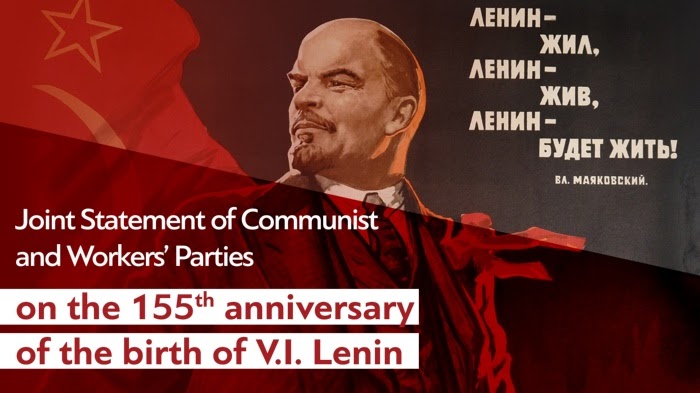By Krishna Jha
The architect of first path breaking event that heralded the new socialist society, Vladimir Ilyich Lenin, was born on April 22, 1870. According to laws of historical materialism, or following the materialist concept of history, Socialism follows capitalism. Whichever socio-economic formation replaces the former stage is always higher. Socialism is also higher than capitalism and superior to it. It is always the result of evolution of productive forces. It takes a new route while in transition. This transition from the industrial to higher levels of industrial organization is always according to historical materialist stance in full.
But it is also to be accepted that evolution through electronics comes like an explosion. It discards the obsolete productive forces and enters a new stage that ushers in a new mode of production and accordingly a social structure, a new stage, where the social structures are new. In fact the very approach to a new path towards socialism has undergone changes. The new system that has blossomed, is based on electronic technology. No big machines or huge industrial complexes are required now. The means of production are also at a stage of huge transition.
And yet, Lenin is highly relevant today. Marxism evolved through struggle with Anarchists, Narodniks, Ultra left, reformists and economists and many more. Lenin was always there to guide and take the movement further. He did not want the cadres just to support the party policies but also help in building it up. Lenin’s famous book What is to be done was written in this context only. The socio-economic divide between capital and the proletariat has taken on dimensions that even Marx would have found hard to imagine.
The term oligarch, coined in the 1990s for the plunderers of Soviet state property, has long since become a global phenomenon. The five richest people in the world own a fortune of 869 billion dollar. They have more than doubled their wealth since 2020, while the majority of the world’s population have become poorer. Bourgeois democracy is disintegrating under the pressure of growing class tensions. Authoritarian and fascist forms of rule are on the rise in many countries.
The context of third world war has been already maturing up. Leading representatives of the imperialist powers insist on keeping the war alive between Russia and Ukraine until Russia is militarily defeated, even if this means nuclear war. Inhuman killing of Palestinians in Gaza keeps spreading into a regional conflagration, fanned up by the US and its European allies.
Lenin’s book Imperialism: The highest stage of Capitalism as a scientific analysis is one of his most relevant writings today. Lenin demonstrated that imperialism is not simply a specific bourgeois policy, but represents the highest stage of capitalism—a stage characterized by decay, parasitism and reaction all along the line; in which monopolies have displaced free competition and finance capital dominating over industrial capital, in which the world is completely divided among the imperialist powers and might be redivided by force.
The conclusion Lenin drew from this analysis was as far-sighted as it was bold. He advocated the transformation of the War into revolutionary civil war and demanded immediate peace without annexations. Imperialism, Lenin concluded, could not be reformed, it had to be overthrown. Moral appeals and pressure on the imperialists to adopt a more peaceful policy could only generate illusions and curb the revolutionary energy of the masses.
Lenin understood that the same objective processes that had led to world war also created the conditions for proletarian revolution. The perspective he had at the time was based on the conclusion that the war and the contradictions of imperialism would drive the masses into revolution.
But while the intensification of the class struggle was an objective, spontaneous process, its outcome, the question of the victory or defeat of the revolution, depended on the existence of a conscious, proletarian leadership.
No one understood this question as sharply as Lenin; herein lies his unique historical role and his genius as a Marxist. He devoted the first thirty years of his political life to the theoretical and political arming of the proletariat. In a tireless polemic against bourgeois and petty-bourgeois tendencies, he fought for the ideological, political and organizational independence of the working class.
Already in his first writings against the Narodniki, he placed central emphasis on the defense of scientific materialism. He fought against opportunism in the socialist movement with a rigor and consistency. Lenin understood that opportunism was not simply a wrong policy but embodied the influence of hostile class forces on the proletariat.
Thus, Lenin created the Bolshevik Party, which led the Russian proletariat to power in 1917. Bolshevism did not mean the power of the apparatus over the membership, as it did under Stalin, but the relentless struggle for programmatic clarity, which gave the party an unprecedented clout and unity of action.
Lenin was an internationalist through and through. With the April Theses of 1917 at the latest, he endorsed the theory of winning over full power by replacing Kerensky’s government by workers’ power.
After the victory of the October Revolution, Lenin—despite the civil war and massive economic difficulties—concentrated much of his energy on reorganizing the world socialist movement and building the Communist International.
The decay of capitalism and the objective preconditions for the world socialist revolution are much more advanced today than they were in Lenin’s time. In large parts of the world that were still economically backward and agrarian at the time, there is now a proletariat of hundreds of millions. The revolutionary struggle of the working class is developing around the world as a cohesive and united movement. This manifests itself in a sharp increase in economic strikes and mass protests against social cuts and war. Millions around the world are taking to the streets against the genocide in Gaza.
This is the timeliness and significance of Lenin’s legacy. (IPA Service)




 In Madhya Pradesh, Congress Leader Digvijay Singh Files FIR Against Baba Ramdev
In Madhya Pradesh, Congress Leader Digvijay Singh Files FIR Against Baba Ramdev 